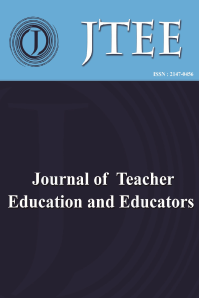Comprehensiveness of Learning Outcomes Formulated in the Newly Designed Ethiopian Primary School Teacher Education Courses
Comprehensiveness of Learning Outcomes Formulated in the Newly Designed Ethiopian Primary School Teacher Education Courses
Learning outcomes, Comprehensiveness of learning outcomes Newly deve-loped Ethiopian primary school teacher education course syllabi,
___
- Escobar B. (2013). Curriculum development CIT. Retrieved from slucurdevcit1st.blogspot.com/2013/02/importance-of-developing-cognitive.html.
- FDRGE. (1994). General education and training policy. Addis Ababa
- ITECH. (2010). Writing good learning objectives.
- Lobo, K. (2013). Curriculum development CIT. Retrieved from slucurdevcit1st blogspot.com/2013/02/importance-of-developing-cognitive.html
- MOE. (2013). Primary School Curriculum and Instruction course module. Unpublished
- MOE. (2010). Curriculum frame work for Ethiopian education (KG-grade12). Addis Ababa.
- MOE. (2007). Civic and ethical education blue print. Addis Ababa. EMPDO.
- MOE. (2003). Teacher Education System Overhaul:-TESO handbook.
- NCTE. (2009). Curriculum framework for teacher education: Towards Preparing Professional and Humane Teacher. Retrieved from http:/www.unc.edu/depts./faculity/syllabus.htlm.
- Pindog, D. (2013). Curriculum development CIT. Retrieved from slucurdevcit1st.blogspot.com/2013/02/importance-of-developing-cognitive.html
- Rosario, C. (2013). Curriculum development CIT. Retrieved from slucurdevcit1st .blogspot.com/2013/02/importance-of-developing-cognitive.html.
- Vinson. D .C. (2014). Learning Domains and Delivery of Instruction. Retrieved from http://pixel.fhda.edu/id/learning-domain.htlm.
- ISSN: 2147-0456
- Başlangıç: 2012
- Yayıncı: İlknur GÖKÇE
Relationship Between Personality Features And Social Loafing Behaviors
Rachel RENBARGER, Brenda DAVİS
Master’s Thesis as Part of Research-Based Teacher Education: A Finnish Case
In-service and pre-service teachers’ orientations to linguistic, cultural and worldview diversity
